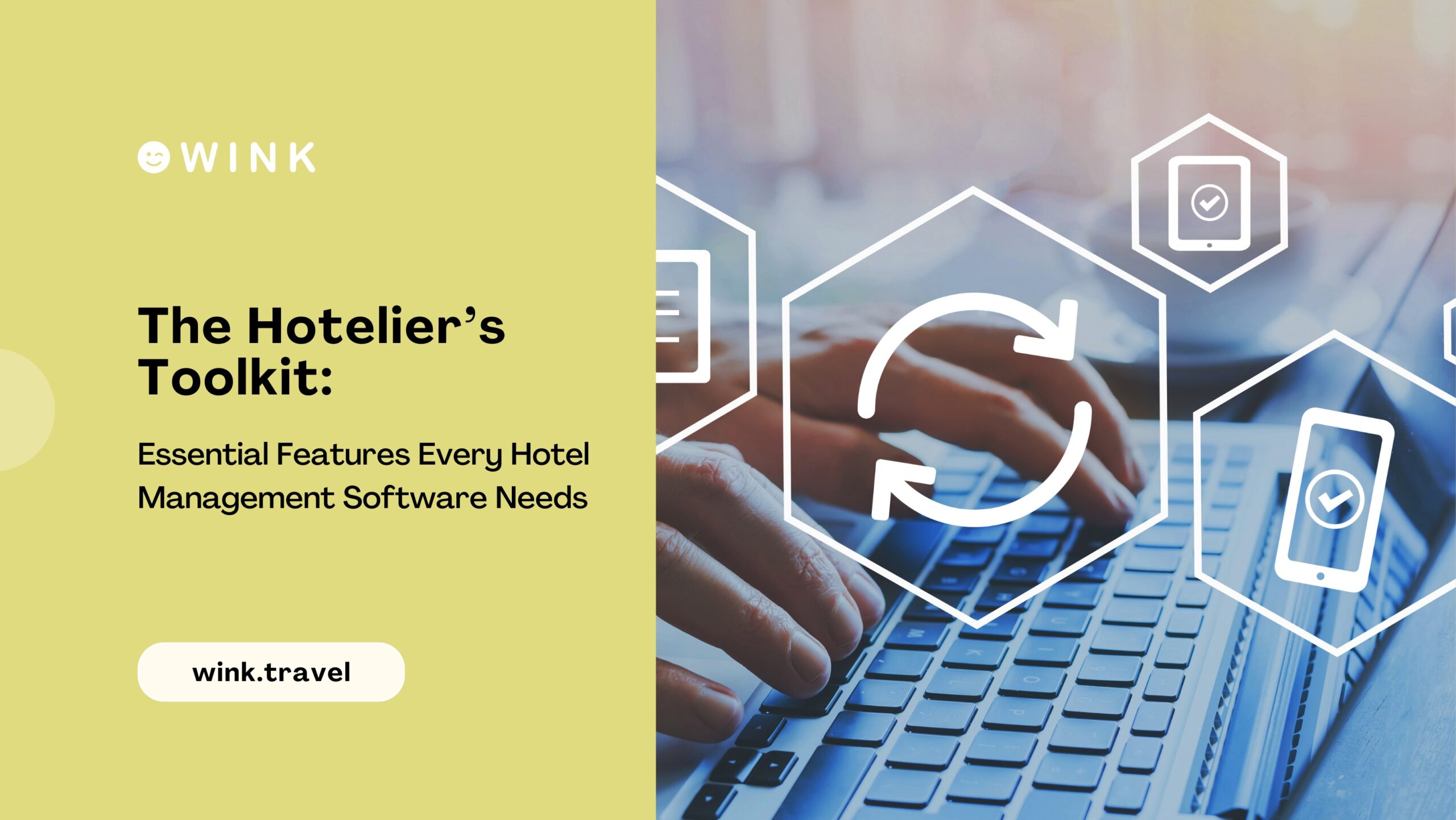In the fast-paced and competitive world of hospitality, where guest expectations are higher than ever and operational efficiency is paramount, hotel management software (HMS) has emerged as a game-changing tool. In fact, a recent Cornell University study revealed that hotels utilizing advanced HMS systems experience a significant 10% increase in RevPAR, highlighting the transformative power of this technology.
In this comprehensive guide, we’ll delve into the essential features every hotelier should look for in their HMS toolkit. From streamlining booking management and maximizing revenue to elevating guest experiences, optimizing operations, and reaching your target audience, we’ll be equipping you with the knowledge to choose the right HMS: one that can revolutionize your hotel’s performance.
Table of Contents
Optimizing Bookings and Revenue with Hotel Management Software
Your HMS should be an incredibly powerful tool: one that acts as a central hub for all your room bookings, keeping track of availability in real-time across all channels. With the right one in place, there’ll be no more worrying about double-bookings or turning away guests because of outdated information.
A HMS should seamlessly integrate with both your own website (direct bookings) and popular online travel agencies (OTAs). This way, whenever a reservation is made, no matter where, it’s instantly reflected everywhere and keeps your inventory clean and ensures potential guests see accurate availability.
Speaking of guests, they expect to get what they see, and see what they get; these real-time updates aren’t just great for inventory management, but also helps build trust by showing them exactly which rooms are available, allowing them to book with confidence.
But that’s not all. A good HMS goes a step further by letting you adjust room rates on the fly, empowering you to optimize pricing based on factors like demand, season, and competitor rates. In short, your HMS helps you maximize your revenue and never leave money on the table.
Leveraging HMS to Delight and Retain Guests
At its core, a guest-centric HMS allows you to create personalized guest profiles. These profiles capture valuable information about your guests’ preferences, from their preferred room type and amenities to their dietary restrictions and special requests. With this knowledge, you can tailor every aspect of their stay, from pre-arrival communications to in-room amenities and services.
Pre-arrival communication is a prime opportunity to make a positive first impression. Your HMS can automate personalized emails or messages, welcoming guests, offering recommendations for local attractions or dining options, and even allowing them to pre-select amenities for their room. This proactive engagement sets the tone for a personalized and memorable stay.
Streamlining check-in and check-out processes is another way to enhance the guest experience. Automated kiosks or mobile payment options can eliminate long queues and reduce wait times, ensuring a smooth and efficient arrival and departure.
In-room tablets or mobile apps can allow guests to easily request additional towels, order room service, or book spa treatments. Integrating your HMS with guest messaging platforms enables real-time communication, ensuring prompt responses to inquiries or requests that ultimately make a difference that guests will remember.
Unlocking Revenue Potential with HMS Analytics
At the heart of revenue optimization lies advanced analytics and reporting. Your HMS should provide you with a comprehensive view of your hotel’s financial performance. Detailed reports on occupancy rates, average daily rates (ADR), revenue per available room (RevPAR), and other key metrics can reveal trends, identify areas for improvement, and help you track the impact of your strategies.
Dynamic pricing strategies are essential in today’s ever-changing market. Your HMS should be capable of automatically adjusting room rates in real-time based on factors like demand, seasonality, competitor pricing, and even events happening in your area. This ensures that you’re always maximizing revenue for each available room.
Forecasting tools are equally important. By analyzing historical data and market trends, your HMS can predict future demand patterns. This allows you to proactively adjust your pricing and inventory strategies to capture the most revenue possible. For example, you might raise rates during peak season or offer special packages during slower periods to attract more guests.
Seamless integration with your financial system is also crucial, with automated data transfer and financial reporting not only saving you time while reducing risk of errors, but also providing you with down-to-the-minute financial insights. This allows you to make timely decisions based on accurate data, further enhancing your ability to optimize revenue with a powerful HMS.
Automating Tasks with Hotel Management Software
One of the most significant ways an HMS boosts operational efficiency is through task automation and workflow management. Repetitive tasks that once consumed valuable staff time, such as data entry, report generation, and even some aspects of guest communication, can be automated. This frees up your staff to focus on higher-value activities, like providing exceptional guest service and personalized interactions.
By optimizing staff schedules based on occupancy, events, and other factors, you can ensure that you have the right people in the right place at the right time. This not only improves efficiency but also helps control labor costs. Additionally, built-in communication tools facilitate seamless communication between departments, reducing misunderstandings and enhancing teamwork.
An HMS can help you keep track of inventory levels in real time, alerting you when supplies are running low and need to be replenished. This prevents stockouts and ensures that you always have the necessary amenities and resources on hand. Similarly, maintenance tracking allows you to schedule preventive maintenance and address repair needs promptly, minimizing downtime and guest inconvenience. These automations may contribute in just small ways alone, but together add up for much greater optimization.
Hotel Management Software for Marketing Success
Finally, let’s talk about CRM tools (Customer Relationship Management). Your HMS can collect and analyze valuable guest data, such as booking history, preferences, and demographics. This allows you to create highly targeted marketing campaigns that resonate with specific segments of your audience, increasing the chances of conversion. Additionally, you can develop loyalty programs to reward repeat guests, fostering long-term relationships and encouraging future bookings.
Your HMS can also automate personalized email campaigns, sending out welcome messages, special offers, and post-stay surveys to keep your hotel top-of-mind for potential and past guests alike. These targeted emails nurture leads, drive direct bookings, and build brand loyalty.
Just as useful is social media integration, which allows you to manage your online reputation and engage with guests on platforms like Facebook, Instagram, and Twitter. By monitoring and responding to comments and reviews, you can showcase your commitment to guest satisfaction and build trust with potential customers. You can also use social media to share engaging content, promotions, and updates about your hotel, keeping your audience informed and interested.
Become even more efficient at reputation management with online review platform integration. Your HMS can aggregate guest reviews from various platforms, making it easier to track your online reputation and respond to feedback. Positive reviews build credibility and attract new guests, while addressing negative reviews can help you resolve issues and show potential customers that you care about their experience.
Finally, your HMS should enable you to create and manage attractive promotional packages and offers. These can be tailored to different seasons, events, or target audiences, enticing guests with special deals and added value. Used correctly, your HMS is an incredible tool that should make your marketing efforts much more rewarding.
Choosing the Right Hotel Management Software
The right hotel management software is a game-changer, transforming your hotel into a well-oiled machine that delivers exceptional guest experiences and drives profitability. By investing in a comprehensive HMS with the essential features outlined in this guide, you’ll empower your hotel to thrive in today’s competitive landscape.
Here’s a quick recap of what you should do when choosing your HMS:
- Define Your Needs: Consider your size, type of property, budget, and the specific features you require. Prioritize features that address your most pressing challenges.
- Research Thoroughly: Take the time to research different hotel management software providers, compare features and pricing, and read online reviews from other hoteliers. Look for software that has a proven track record and a strong reputation in the industry.
- Request Demos and Trials: Most reputable vendors offer demos or free trials of their software. Take advantage of these opportunities to test the system firsthand, explore its features, and see if it’s a good fit for your hotel’s workflow.
- Consider Scalability and Support: Choose a system that can grow with your business. As your hotel expands or your needs evolve, you’ll want software that can adapt and accommodate your changing requirements. Additionally, ensure the provider offers reliable customer support and training resources to help you get the most out of the software.

Common Pitfalls to Avoid
As powerful as the right hotel management software can be, it’s important to remember that simply choosing the right one isn’t all you have to do. You’ll have to ensure proper installation across all systems, that your staff are trained to use it effectively, and more.
Below are some of the most common problems that arise during HMS implementation.
- Underestimating Implementation Time: Implementing new software takes time and planning. Don’t rush the process; allocate sufficient time for training, data migration, and system testing.
- Overlooking Integration: Ensure your HMS integrates seamlessly with your other systems, such as your property management system (PMS), point-of-sale (POS) system, and revenue management tools. This integration is crucial for efficient data sharing and a smooth workflow.
- Neglecting Security: Choose a software provider that prioritizes data security and complies with industry standards like PCI DSS (Payment Card Industry Data Security Standard). Protect your guests’ sensitive information and safeguard your hotel’s reputation.
If you’re ready to harness the power of technology and elevate your hotel’s performance, we invite you to explore Wink. Our intuitive platform is designed specifically for hoteliers, offering a comprehensive suite of tools to streamline your operations, enhance guest satisfaction, and drive revenue growth. Don’t just take our word for it – schedule a demo today and discover how Wink can transform your hotel into a well-oiled machine that delivers exceptional guest experiences and achieves lasting success.









